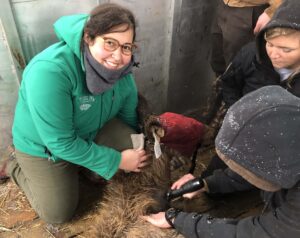Gabriela Wolf-Gonzalez: Seeking collaborative solutions for community-based climate planning
 UMaine master’s student Gabriela Wolf-Gonzalez is collaboratively leading a new project to help tourism-dependent communities in Maine plan for climate change.
UMaine master’s student Gabriela Wolf-Gonzalez is collaboratively leading a new project to help tourism-dependent communities in Maine plan for climate change.
Master’s degree program: Ecology and Environmental Sciences
Research program: NRT: Enhancing Conservation Science and Practice
Advisors: Sandra de Urioste-Stone, Sarah Nelson
Mitchell Center project: We’re All in This Together: Participatory Planning for Community-Based Climate Change Adaptation
Feature story on Gabriela’s work: ‘We’re all in this together’: Students lead climate-planning project (Dec. 2020)
What problem(s) are you working to solve?
I am hoping to understand the link between awareness, knowledge, and action within conservation research. What are the barriers to action and participation, do we really need more information before we act?
What progress are you making toward solutions?
I am currently learning about risk perception theories and how large-scale communication can affect the public’s perceptions of certain issues (e.g., climate change).
How could your findings contribute to a sustainable future in Maine and beyond?
As a team, we’re working to compile and provide relevant information for communities that are interested in learning about the local impacts of climate change and developing plans to prepare for future impacts.
Why did you get involved with this Mitchell Center project?
I am currently part of the UMaine NSF National Research Traineeship (NRT) in Conservation. One of the goals of the NRT is to develop a collaborative project among the students. To fulfill this, my group started discussing what our mutual interests were and how we can expand our own research to develop something exciting.
What do you like best about working on an interdisciplinary team? What is most challenging?
I love learning new things and getting to know people. I’m constantly amazed at the different philosophies of research and who uses what. However, sometimes overcoming “language” barriers is difficult within an interdisciplinary team.
What do you find rewarding about collaborating with stakeholders? Most challenging?
I’m so glad to be part of this team, making an effort to actually “use” science and develop relationships that go beyond research.
What sustains you?
Earl Grey lattes, memes, and knowing that my work will reach communities I have interacted with.
Where do you hope to be in five years?
I hope to be living in Oregon and working with underserved communities and empowering them to be involved in conservation.
